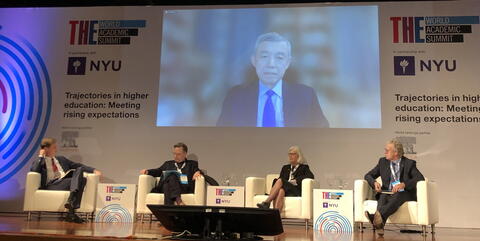
The Times Higher Education Summit: Discussions between Universities from Around the Globe
This month, Sorbonne University, along with members of the 4EU+ Alliance from Copenhagen and Warsaw, gathered in New York to attend this international conference for the first time. The THE summit was an opportunity to speak with established partners as well as to explore collaborations with new establishments. We spoke with the rectors from Copenhagen and Warsaw, as well as Guillaume Fiquet, the vice president of International Relations and Territorial partnerships, to learn their impressions of the event.
The 2023 Times Higher Education World Academic Summit was held in New York from the 10-12 October, 2022, and brought together university rectors, vice-rectors and high-level administrators from all over the world. The three-day conference schedule was packed with interesting topics, ranging from institutional operations, student success and engagement with external stakeholders. The conference attendees heard from higher education professionals from almost every continent.
Attending a conference of this size for the first time, Sorbonne University Vice President Guillaume Fiquet was pleased to find that many discussions focused on the complex situations around the world, geopolitical tensions, the environmental crisis, the health crisis, the war and the role of universities within it all.
“It was a nice surprise, because when you are attending this type of conference, you are expecting it to be all about the elite or the best universities in the world. The topics, in fact, covered a much broader range.
The conference also provided the opportunity to speak with university presidents and rectors from all over the world and from diverse situations. This was quite refreshing, opening dialog on the benefits of different university models and how we can improve our own operations.”
“We have seen many brilliant universities use different economic models that are becoming quite expensive for students. This reinforces my conviction that in Europe, we are right to maintain our universities as a public service. Universities are the best investment that a nation can make in its youth.”
This reinforces my conviction that in Europe, we are right to maintain our universities as a public service. Universities are the best investment that a nation can make in its youth.
Professor Henrik Wegener, the rector of the University of Copenhagen, appreciated the high-level discussions on international collaboration and political issues, which are experienced by all universities irrespective of their national model.
“However, the conference sessions also highlighted how the world doesn’t see these situations exactly the same way. The notions of openness and globalization are being re-negotiated and redefined. I think it is valuable to bring these discussions back to Danish universities as well.
I was also taken with the sessions discussing external stakeholder positions, such as the media, politicians and thought-leaders from outside the university sector.”
Professor Wegener primarily attended student education sessions, particularly those with students on the panel.
“For decades, universities (and politicians) have focused a lot on educating students for future employment. But students are pushing us in another direction. For the first time in a very long time, students are aiming higher than just getting their first job. I hear students say, “Give us degrees that will help us fix the terrible mess that you have made of the planet.” I’ve heard this in a number of student presentations and I think it’s very inspirational.”
The theme of the conference was “Trajectories,” designed to inspire universities to find ways to move forward. The conference was also an opportunity to announce the 2023 Times Higher Education University Rankings.
Professor Alojzy Z. Nowak, the rector of the University of Warsaw, noted that, “despite mobility, the free exchange of ideas and the ability to attend online classes at excellent universities, the disparity between the best-ranked universities and those in a lower position has not changed.” While he agrees with most of the ranking criteria, he would like to have more open discussions on how to improve the university’s performance, as well as its ranking.
“What surprised me during discussions with my colleagues from all over the world is that it seems that universities everywhere have the same problems—a lack of money to finance research, even in America and Western Europe.”
While the conference was organized by Times Higher Education, which has its own university ranking, there was a shift in the discussion of evaluation processes for university quality. The SDG (Sustainable Development Goals) were mentioned regularly as an equally important—if not more important—measure of the advancement of university goals and contributions. While rankings have held sway over the judgement of the “best” university, the conference consensus was strongly in favor of using SDG measurement of societal engagement in the future.
Pictured (above, right): Sorbonne University vice president Guillaume Fiquet (right) with University of Warsaw rector Alojzy Z. Nowak (middle) and University of Copenhagen rector Henrik Wegener.
Below, Guillaume Fiquet participating in a panel talk during the THE Summit, entitled "How can universities be incentivised to innovate?"

